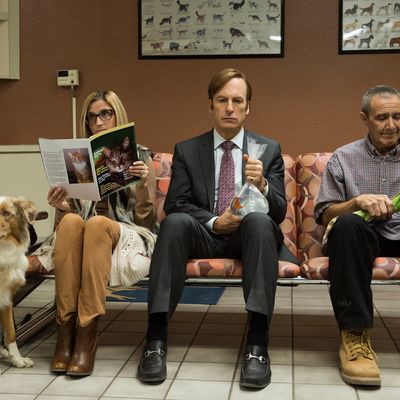
The shame of Chuck and Jimmy’s sibling rivalry is that, given each man’s complementary skills and shared capacity for retention, they’d make a dynamic team. Jimmy never forgot what a stickler his brother is for details. In the opening flashback, Chuck recruits Jimmy to perform an elaborate lie for Rebecca, who’s passing through New Mexico while on tour. To mask his electromagnetic hypersensitivity — and his sensitivity for her — he blames the utility company for turning off his power.
“The deadbeat at 512 San Cristobal hasn’t been paying his bills,” Chuck relays, waiting for Rebecca to clarify, “I’m 215.” But no sooner than she’d been lulled by nostalgia and sea bass, the jig is up. She answers a call from her conductor, Andre, triggering one of Chuck’s EHS attacks and compelling him to seize and sling her phone across the house. Rather than explain his condition and risk vulnerability, he admonishes Rebecca for rudeness, and she leaves certain that the man she once married is still consumed by control. But Jimmy knows that the notion of venerable attorney Chuck McGill, founding partner of his own namesake firm and reliable witness in a case he brought against his own flesh and blood, is pure theater. And he’s prepared to pull the curtain back.
Jimmy’s final provocation is defining, leaving no doubt for the state bar or anyone else that Chuck has effectively conspired to undermine his brother’s success for years and entrapped him out of spite. Yet there are no high-fives this time, no drinks on Jimmy. Chuck, outed as both a sufferer of psychosomatic illness and vindictive manipulator, is disgraced, left alone on the stand to bear the torment of a buzzing exit sign and Rebecca’s pitying expression. Jimmy is frustrated and sad, but he’s also no sheep.
The truth is Chuck seemed desperate even before his cross-examination. Likening himself to the Unabomber’s brother and reaching for false EHS-science equivalencies (AIDS, really?) doesn’t bode well for steady testimony. Howard knew it, too: He was pensive heading into the proceedings, pursed and pinched during and after Kim’s line of questioning, and deflated once the wheels came off. Heaven has fallen, justice is done, and it’s far too late for HHM to save face.
Of course, Kim isn’t immune to the collateral damage. She comes clean to Paige and Kevin about the case against Jimmy, offering them the chance to opt out. But Kevin, giddy over their latest legal triumph, assures Kim that Chuck is “not going to screw me out of the best outside counsel I’ve ever had.” The shame of it is that he’s right: Kim is the best person for the job, for any client who will have her. That’s why Jimmy doctored those Mesa Verde documents to begin with (that and to taunt Chuck about his numerical recall), or so he claimed on what should have been damning audio evidence played for the bar committee. Now that Kim has seen the siblings’ history come to a head in court — knowing full well she was complicit in setting Chuck up to be duped and humiliated — she has to wonder whether their actions have ultimately served a childish grudge.
The real winners here are us viewers, because Jimmy’s subterfuge (with a special assist by Francesca, of course, well on her way to becoming Breaking Bad’s paper-shredding misfit) opens the door for a man who may not fit in tight spaces but can plant cellphone batteries on unsuspecting rubes like no one else. Huell, Saul Goodman’s loyal errand man, gets his meet-cute with Jimmy, a union liaised by Caldera the creepy vet. (And yes, Lavell Crawford clearly lost a few pounds since Breaking Bad, but we’ll continue suspending disbelief about this prequel’s returning characters and their changing, aging shapes.) As a further twist of the knife, Huell rises and informs the bar that he slipped the battery inside Chuck’s pocket precisely an hour and 43 minutes earlier, the sort of specificity Chuck himself would otherwise admire.
There’s plenty left to unravel, like to what extent Jimmy is still beholden to the terms of his PPD and if Chuck is deemed unfit to practice. Not to mention whether Jimmy’s goldfish lived long enough to be swimming happily in a bowl at home. Or, for that matter, why no one thought to ask how Jimmy got those photos from inside Chuck’s house to exhibit, and if that corroboration with Mike might bite him in his law-abiding ass. Though there were no truer words than the ones Jimmy utters to Chuck in that aforementioned flashback: “The bigger the lie, the harder it can be to dig out.” If the opening sequence’s familiar icon of outdoor advertising is any indication, Jimmy is about to be buried deep over his head.
Apart From All That
• Nice to see John Getz, who will always have the hearts of Don’t Tell Mom the Babysitter’s Dead fans.
• The Vincent Griego Chambers are a real thing.
• Rebecca was kind of a snoot anyway.
• Perhaps we’ll soon find out if Jimmy really did steal his father’s money?
• And I guess Jimmy and Kim are still sleeping together?
• That Chuck and his reserved parking space. He’s incorrigible.
• Director Daniel Sackheim and Vince Gilligan go wayyyyy back to the earliest X-Files days.
• Chuck is a prick, but Jimmy exposing and exacerbating his brother’s mental state is pretty dickish.

